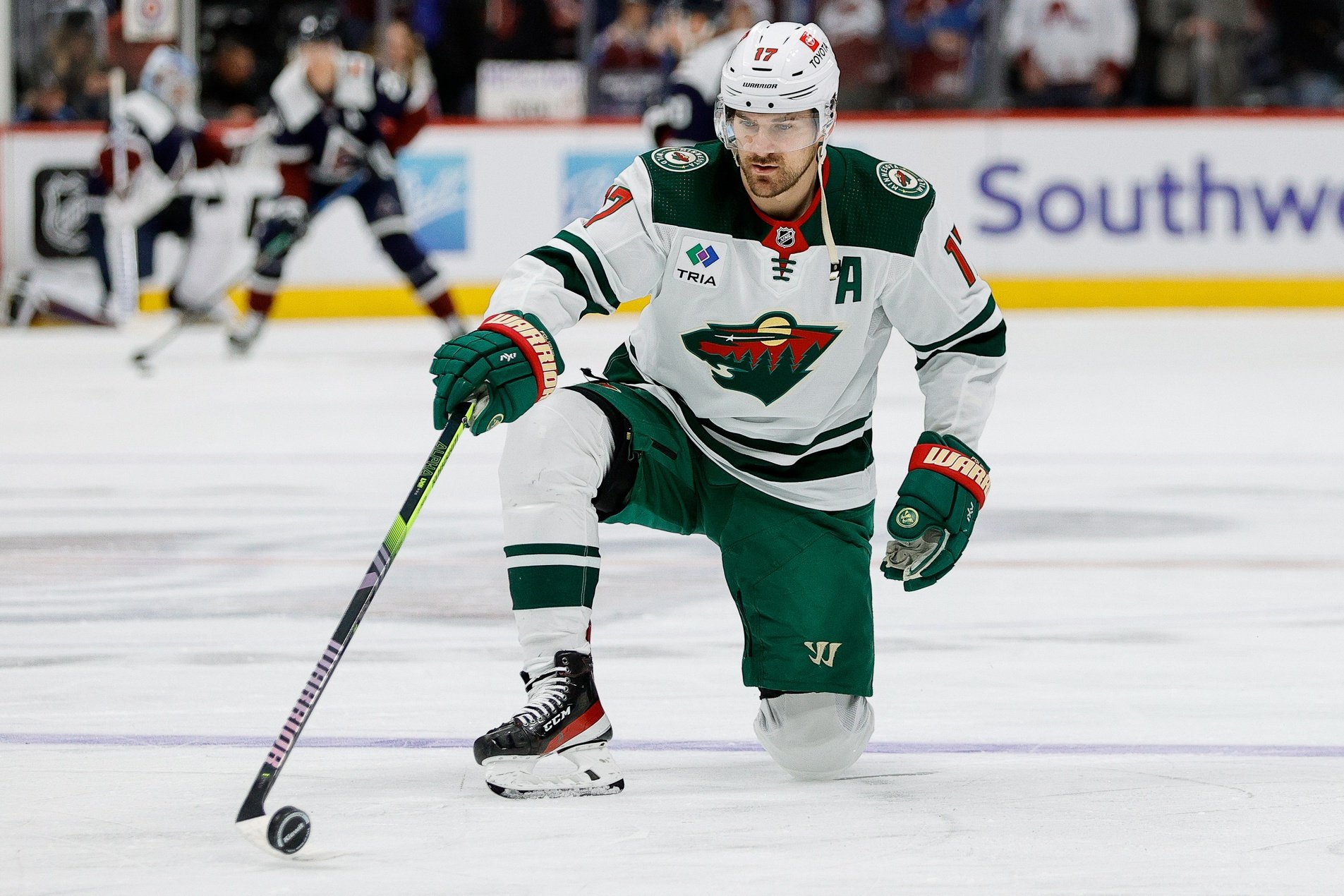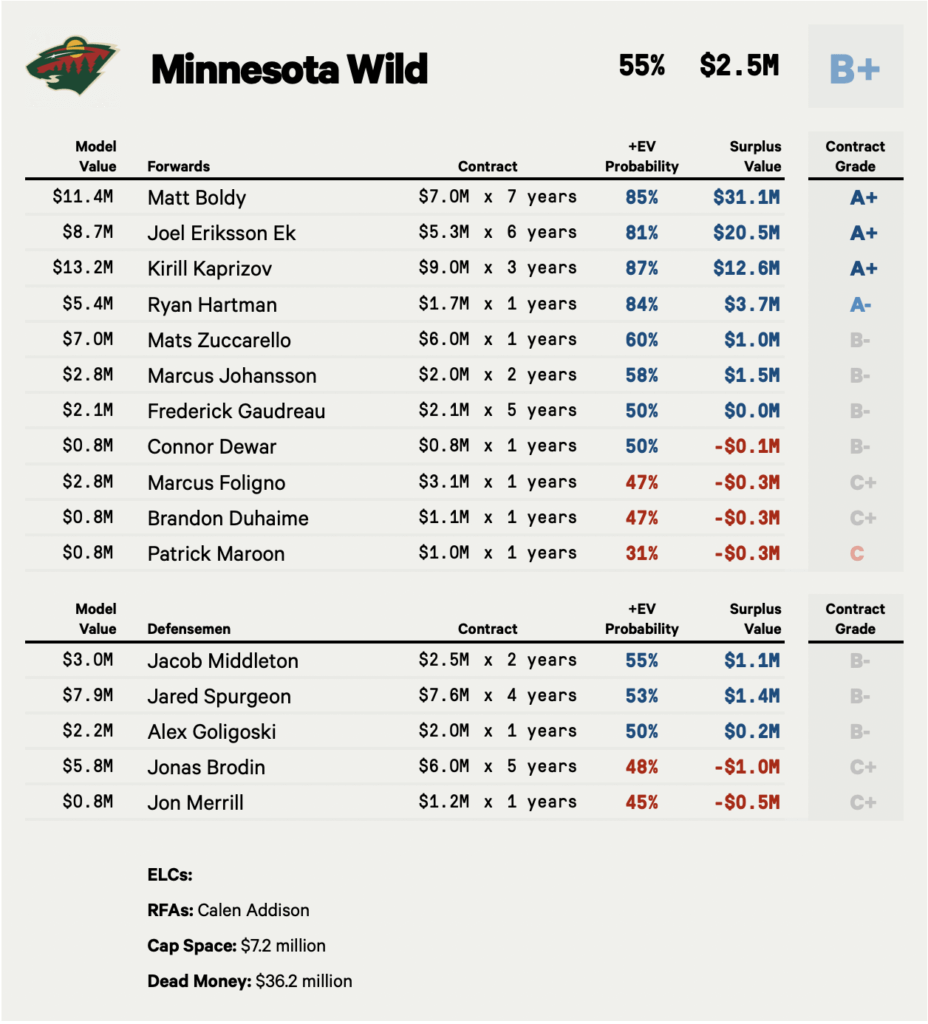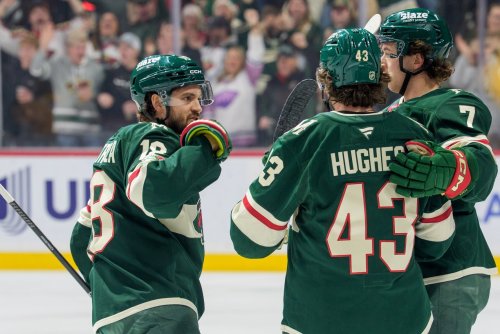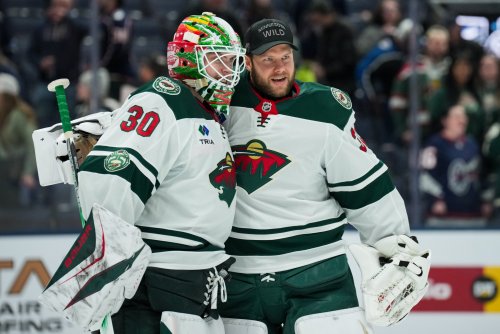
Just a year ago, the Minnesota Wild had one of the cleanest salary cap pictures in the NHL. Despite having two years of Zach Parise and Ryan Suter's dead money counting against them, Dom Luszczyszyn ranked the Wild as the sixth-most efficient spenders in the NHL. A quick look at their contracts made it obvious why.

Their three best players, Matt Boldy, Joel Eriksson Ek, and Kirill Kaprizov, were their three best contracts, and it wasn't close. Beyond that, almost everyone was either on a contract at a decent value, short-term, or both. When your worst contract is a one-year, $1 million pact with Patrick Maroon, that's an excellent spot to be in.
There's one fewer year of cap hell from the Parise/Suter buyouts. Still, the Wild have fallen precipitously in Luszczyszyn's rankings. This year, the contracts on the books earned a collective grade of a C, ranking 19th overall in the NHL. They have tumbled 13 places, the biggest year-to-year drop of any team in the league.
Remember how Maroon was the worst contract on the team last year? Just 12 months later, there are four contracts on Minnesota's books that earn a lower grade. A down year for Freddy Gaudreau bumps his deal from a B-minus to a C-minus. Yakov Trenin, the Wild's biggest free agent this offseason, got a deal that is worth about half as much as his projected value. That deal gets a D-plus grade. Then Marcus Foligno and Jake Middleton's new extensions earned solid D and D-minus grades, respectively.
It won't surprise anyone who's been reading Hockey Wilderness for the past year or so. Still, seeing the numbers like that should serve as a final slap of reality to anyone who needs it. Bill Guerin just completed a speedrun of blowing up his cap picture.
It sounds counterintuitive, but slapping on those buyout handcuffs seemed to be the best thing for Guerin. Bill Guerin squeezed value out of cheap deals with Ryan Hartman, Foligno, and Gaudreau with aplomb. Moving a soon-to-be $7.8 million winger in Fiala and getting a top-pairing defenseman on an ELC in Brock Faber was a masterstroke. Minnesota's cap crisis undoubtedly influenced discounts on Boldy and Eriksson Ek.
Limitations can create great, innovative moves. Now that we see Guerin operate a salary cap without handicaps -- remember, many of these deals extend well past the worst of the Parise/Suter buyout penalties fall off -- we have more to point to the idea that these limitations forced Guerin into shrewd moves, rather than Guerin being a particularly shrewd GM.
Just look at some of these projected shortfalls from these contracts. Despite making only $2.1 million annually, the Wild are poised to get an annual deficit of minus-$1.3 million surplus value over the next four years. Combine that with the deficits projected from Trenin ($1.8 million), Foligno ($2.4 million), and Middleton ($2.9 million), and that adds up to about $8.4 million per year of value those four deals flush away.
As great as Boldy and Eriksson Ek's contracts are (a combined $7.5 million in surplus for the next five seasons), we see that Guerin's four recent bad deals negate his best ones entirely.
Perhaps you can say that it's okay if those deals more-or-less offset each other to something close to a break-even point. What that assessment doesn't factor in, though, is opportunity cost. In other words, what would you spend with an extra $7.5-$8.4 million to throw around?
Turns out, the Wild could get a pretty good player if they had that surplus value freed up. Last offseason, the Detroit Red Wings were able to essentially sign-and-trade for Alex DeBrincat, a two-time 40-goal scorer who put up 27 goals last season. His cap hit comes in at $7.88 million. The Vegas Golden Knights got Tomas Hertl ($8.14 million AAV) and Noah Hanifin (extended for eight years, $7.35 AAV) at the most recent trade deadline.
Even looking forward, if those Brady Tkachuk trade rumors that are definitely bogus, according to the Ottawa Senators, end up being not-so-bogus, his cap hit would end up being $8.21 million. If the Wild want to make a Nashville Predators-type free agent splash in the 2025 class, that surplus value would sure come in handy.
Sure, these are all hypotheticals and what-ifs, but part of the reason moves where Minnesota could make a true splash in a post-Parise/Suter Cap Apocalypse world are off the table is because Guerin likely spent his windfall already, and poorly.
It's left the Wild in a position where they will rely heavily on Judd Brackett to get this team over the hump. You've got to find surplus value somewhere to contend, and it's going to be on the backs of players on Entry-Level Contracts. The Liam Öhgrens, Riley Heidts, Danila Yurovs, Jesper Wallstedts, and Zeev Buiums of the world are going to have to maximize those ultra-cheap years. While we saw Matt Boldy and Brock Faber deliver big during their ELC years, we've seen that that doesn't always happen, even with players who turn into studs.
It's possible for this team to break through and enjoy a deep playoff or even Stanley Cup run. However, the most disappointing part of all this is how thin the margin for errors is, thanks to many self-inflicted mistakes. Hopefully, that tendency to work magic while having to shop in the discount bin appears again for Guerin because it's looking increasingly more like he'll need to pull those rabbits out of his hat, even without the Parise/Suter anchors weighing his cap down.
Think you could write a story like this? Hockey Wilderness wants you to develop your voice, find an audience, and we'll pay you to do it. Just fill out this form.
-
 2
2







Recommended Comments
Join the conversation
You can post now and register later. If you have an account, sign in now to post with your account.
Note: Your post will require moderator approval before it will be visible.